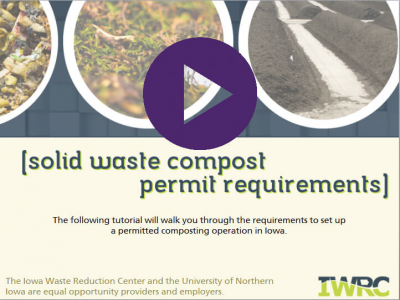Of the 43 municipal landfills currently operating in Iowa only four have integrated food waste composting as part of their operation. In Iowa, the estimated amount of landfilled food waste increased 61% from 1998 to 2011 and has become the most prevalent municipal solid waste material in landfills. Landfill operators can play a vital role in helping the IWRC to decrease this food waste and divert it to useful alternatives in two ways.
 Educate the Public and Businesses
Educate the Public and Businesses
With tipping fees relatively low, on average only $35 per ton, businesses see it as more cost effective to just throw excess food in the garbage than set up a proper composting operation. Use the resources on this website to educate the public and businesses in what they can do.
Set Up Composting Operations On-Site
The long-term benefits of setting up composting operations on-site are innumerable, but there is no denying it is a process to get started. The permitting process for a composting operation can be both time consuming and cost-prohibitive, however, there are several exemptions from requiring a full permit, and there is also the permit-by-rule regulation. This regulation, which allows a composting facility to collect up to two tons of food waste from outside sources per week, does have some requirements, but they are less stringent and can be implemented almost immediately.
The development of this material is funded by the United States Department of Agriculture. This material is based upon work supported under a grant by the Rural Utilities Service, United States Department of Agriculture. Any opinions, findings and conclusions or recommendations expressed in this material are solely the responsibility of the authors and do not necessarily represent the official views of the Rural Utilities Service.
The Iowa Waste Reduction Center and the University of Northern Iowa are an equal opportunity provider and employer.

